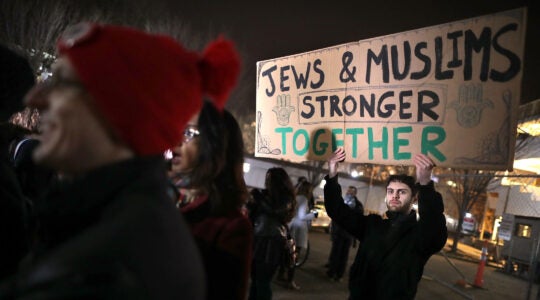The Forward’s Anthony Weiss has an excellent story this week about salaries of executives at major Jewish organizations.As the nonprofit world contracts, and organizations everywhere slash payroll through layoffs, the Forward asked who among the professional elite of the Jewish world took pay cuts as they laid off lower level employees.
For the full list of the more than 20 organizations the Forward surveyed, check out this link.
In some cases, CEOs shared in the fiscal responsibilities: The CEOs of the JUF/Jewish Federation of Metropolitan Chicago, the Combined Jewish Philanthropies of Boston, and the Jewish Federation of Cleveland all took major pay cuts as they laid off staff.
“We have subscribed to the philosophy that we all have skin in this game,” said William Bernstein, president and CEO of the Jewish Federation of South Palm Beach County. Bernstein, whose donors were hard-hit by the Bernard Madoff scandal, laid off 32 out of 160 staff members and slashed his organization’s operating budget by 25%. He said that he had taken a reduction in his salary, which in 2006–07 was $418,511, but declined to specify the amount. “If the agencies we support had to take significant cuts, if the people who are our recipients were seeing cutbacks in service and our donors themselves were having significant problems in their lives managing their own personal finances, it seemed hard for us, even those of us who had contracts, to feel that we could continue to be compensated at levels that were decided upon pre-recession.”
But there are several notables who did not take salary cuts, despite laying off significant staff, according to the Forward:
- Richard Joel, president of Yeshiva University, laid off 60 employees and made $676,004 in 2007-07
- Steve Schwager, executive director of the American Jewish Joint Distribution Committee, laid off 60 employees and made $430,258 in 2006-07
- John Ruskay, the CEO of UJA-Federation of New York, laid off 52 employees and made $419,000 in 2007.
- Howard Rieger, the CEO of United Jewish Communities CEO laid off more than 60 employees over the past year or so, and made $555,000 in 2006–07 and received $150,000 in expenses to offset the high cost of living in New York.
- Ira Schwartz, president and CEO of the Jewish Federation of Greater Philadelphia, laid off 5 people and made $434,000 in 2006–07.
- Gideon Aronoff, president and CEO of the Hebrew Immigrant Aid Society, laid off 4 employees and earned $250,000 in 2007.
Rieger, who reportedly taken a salary freeze, was quoted in the story:
“I think sometimes people are making those decisions for not the right reason, because it appears to be the right thing to do from a political perspective,” said Howard Rieger, president and CEO of United Jewish Communities, the national umbrella organization of federations. Rieger made $555,000 in the 2006-07 tax year, and also received $150,000 in expenses to offset the high cost of living in New York. His organization has cut 31 staff positions over the past year. Rieger, who moved to New York from Pittsburgh in 2004 to take his job, added that in a competitive marketplace for management talent, not-for-profits needed to weigh the urge to cut salaries for the sake of appearances against the need to pay enough to retain top-flight employees.
As was Aronoff:
“We considered all of the approaches and decided that the best way to do it — to leave things as much as possible the way they were before the economic downturn — was this scalpel-like cutting,” said Gideon Aronoff, president and CEO of the Hebrew Immigrant Aid Society. Aronoff, who earned $250,000 in 2007, laid off four of his organization’s 70 employees, in addition to implementing various other cuts in expenses.
Aronoff added that salary reductions for himself and other senior managers were “on the table” when the final budget numbers came in, but that the numbers worked out in a way that made salary cuts unnecessary. Aronoff did participate in an organization-wide giveback of four vacation days for all employees.
The Forward also ran a companion editorial with the story, giving CEOs who didn’t take pay cuts some mussar:
Some of the executives whose salaries declined spoke of the ethical dimension of their behavior. Some of the executives whose salaries remained untouched displayed an arrogance stunning for this time, or any time. Howard Rieger, president and CEO of United Jewish Communities, all but dismissed executive pay cuts as “political,” even though his organization has laid off 31 staff members over the last year while his salary and annual expense allowance topped out at more than $700,000. And that was just in 2006-07.
JTA has documented Jewish history in real-time for over a century. Keep our journalism strong by joining us in supporting independent, award-winning reporting.





